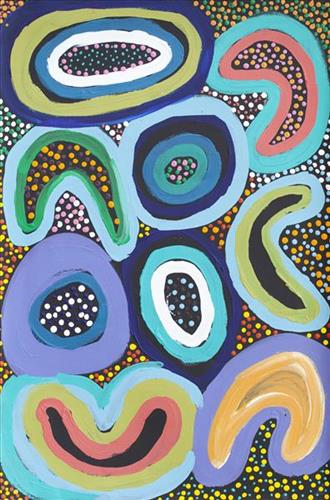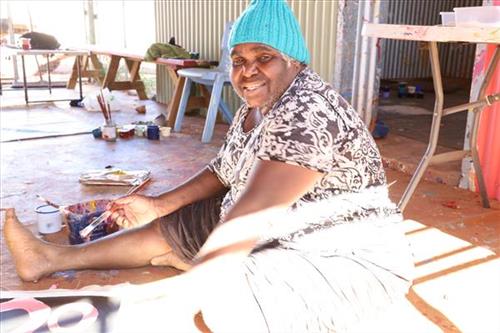Biography:
“Wantili is my place, where I was born. It’s a place where everyone was living – it’s all of their ngurra (home). It’s the Jukurrpa (Dreaming) of that place. All those claypans, a place where everyone comes together for ceremony and gatherings, all meeting with different families. I went there with my aunt [Jakayu Biljabu] and my sister [Kumpaya Girgirba] - they told me the story of where I was born, in pujiman (traditional, desert dwelling) times. We walked all over the place, I was just a little one.”
- Gladys Bidu Kuru
Gladys is a Karimarra woman, she was born near Wantili and speaks Manjilyajarra. Gladys and her family were picked up when she was a baby in Yulpul and taken first to Parngurr, then to Jigalong Mission, where she attended the mission school. From there she travelled with her family to Strelley Station, and then to Camp 61, an outstation on Bilanooka Station. “We stayed there with the old people, so many old people they set up a Martu school there” she says, “Then we heard Martu were going back to their homeland, their ngurra, so then we came to Punmu with those old people, Mr Lane and the other old people.” Settling in Punmu during the Return to Country movement of the early 1980s, Gladys assisted with the establishment of the Punmu School in the Community’s bough shelter when she was looking after her sister’s children.
Today Gladys is an accomplished teacher and respected cultural advisor for the Kanyirninpa Jukurrpa Martu ranger program, and works with Punmu School as a senior cultural and linguistics adviser and board member. “I speak on behave of Martu as a board member of the school and KJ and with Martumili. I am a cultural adviser and language adviser supporting people with interpreting, recording, going out bush and going to conferences for language. The school has two way learning: Martu way and English. Helping people to be strong in both ways. It’s a lot of travel many, many places.”
Gladys was taught to paint in Jigalong by her aunt, renowned senior artist Jakayu Biljabu, and the two now regularly paint together. Gladys paints her ngurra (home Country, camp) of Wantili a large round jurnu (soak) and linyji (claypan) near Well 25 on the Canning Stock Route. The area is dominated by claypans surrounded by tuwa (sandhills), and Nyilangkurr, a prominent yapu (hill) is located on the edge of the claypan. Following rain the typically dry claypans are filled with water, with the overflow from nearby waterholes flowing to Wantili. At that time, Wantili becomes an important place for obtaining fresh water for drinking and bathing. Wantili is significant for the fact that at this site Kartujarra, Manyjilyjarra, Putijarra and Warnman people would all come together for ceremonies during the pujiman (traditional, desert dwelling) era. Many jiwa (stones used by women for grinding seeds) from these times can still be found there today.




